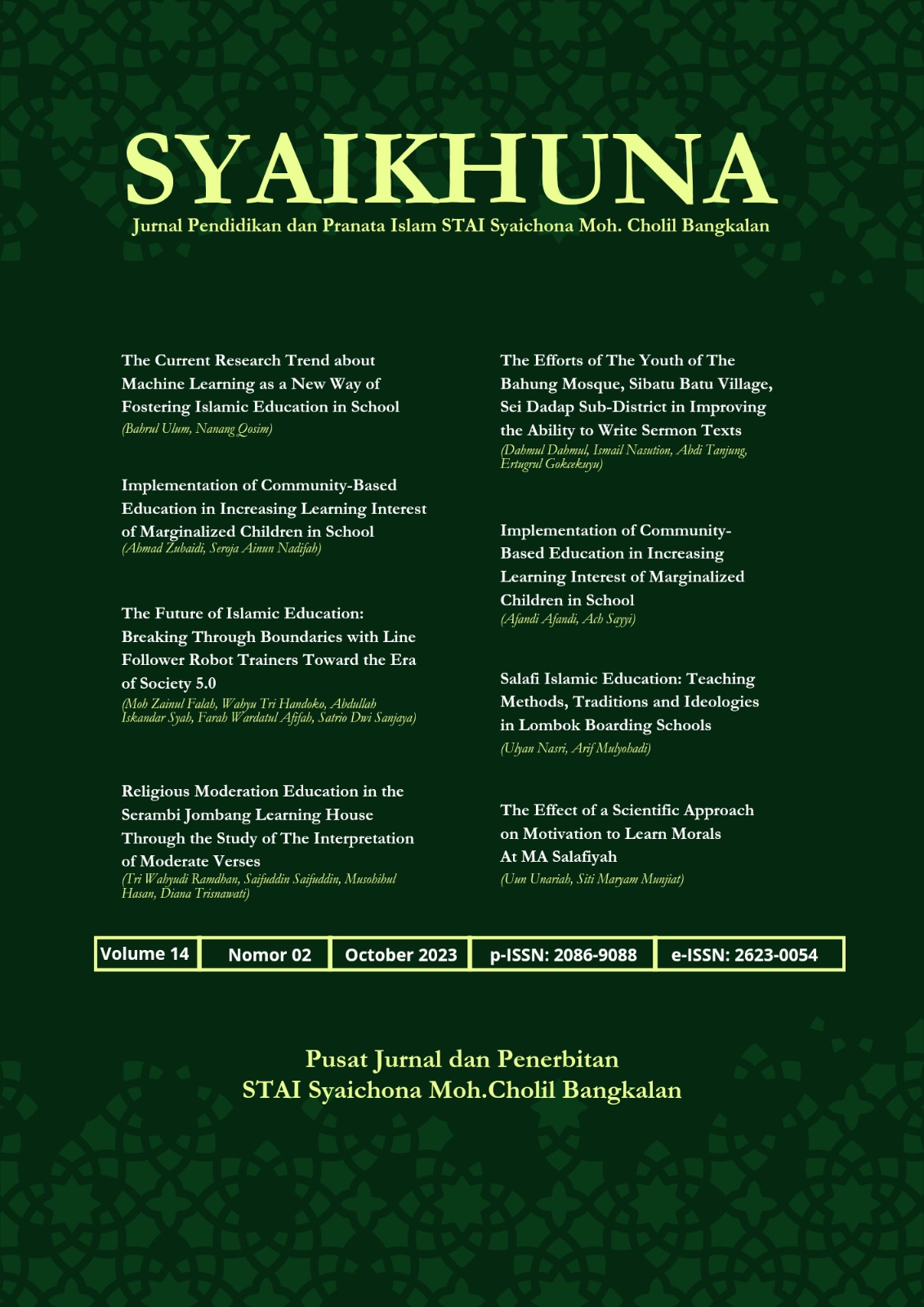The Effect of a Scientific Approach on Motivation to Learn Morals at MA Salafiyah
DOI:
https://doi.org/10.58223/syaikhuna.v14i02.7038Keywords:
Effect, Scientific Approach , Motivation, Learn MoralsAbstract
The number of students who do not actively participate in the teaching and learning process, such as rarely asking questions or voicing ideas, and also not reacting to the teacher's answers, one of the triggers is that the learning approach in Aqidah Akhlak subjects focuses more on teachers lecturing students and telling stories so that learning activities tend to be mainly carried out by teachers even though an educator plays a vital role in the achievement of an effective learning process. This study aims to analyze the effect of scientific methods on increasing student interest in learning aqidah subjects. By using a quantitative descriptive method through a saturated sampling technique involving 30 students with pree-test and post-test with sig value indicator 0.05 along with hypothesis testing and resulting in the conclusion that Ha is accepted and Ho is rejected based on the influence of scientific methods on learning motivation (tcount> ttable, namely 4.760> 2.048). This shows that learning motivation is strongly influenced by scientific-based learning. Although 55.3% of the influence is caused by causes other than the desire to learn, 44.7% of the influence is of high quality. From the determination test data, it can be concluded that the scientific method influences learning motivation.References
Arifin, Z. (2017). Curriculum Development Concepts and Models, Bandung: Youth
Arifuddin, R, Yulianto, A., & Alman, A. (2021). The Effect of a Scientific Approach on the Learning Motivation of Grade IV Students at SD YPK 4 Pniel Kota Sorang, Journal of Papeda: Journal of Basic Education Publications, 3(1).
Asrul et all, (2018), Creative Thinking Analysis Motivation and Concept, : Journal of Primary Education
Dimyati, & Mujiono, (2018), Learning and Teaching. Bandung: Yrama Widya
Ekawati, Diah Noviani, (2016). Scientific Approach to Competency in Thermal Energy Concepts, Special Education Journal.
Ghozali , Iman, (2017). Multivariate Analysis Application with SPSS 23 Program, Semarang: Erlangga.
Hamalik, O. (2017). Curriculum Development Management , Bandung: Rosdakarya Youth
Hasan, Nur, (2019). Implementation of a Scientific Approach in increasing interest in learning PAI at Kartika Grati Vocational High School, Pasuruan Regency, Journal of Al Makripat Islamic Studies: Vol.4 No 2.
Hidayat, S. (2017), New Curriculum Development , Bandung: Rosdakarya
Hosnan, (2016 ). Scientific and Contextual Approaches in 21st Century Learning (key to successful implementation of the 2013 curriculum). Bogor: Ghalia Indonesia
Idi, A. (2016 ). Theory & Practice Curriculum Development , Jakarta: Pt Raja Grafinda Perseda.
Ministry of Education and Culture, (2016 ) Minister of Education and Culture Regulation, number 24, 2016, concerning Core Competencies and Basic Competencies in the 2013 Curriculum .
Kurino, (2019). Implementation of a Scientific Approach with the Project Based Learning (PJBL) Model in Mathematics Subjects National educational seminar. Cakrawala Journal, Vol.4(2).
Kurniasih, I. & Sani, B. (2016) Revision of the 2013 Curriculum, Implementation of Concepts and Roles , Jakarta: Pen's Words.
Lestari, W., Pratama, L., D., & Jailani, J. (2018). Implementation of STAD Type Cooperative Setting Scientific Approach to Learning Motivation and Mathematics Learning Achievement. AXIOMA . Journal of Mathematics and Mathematics Education, 9(1),29-36.
Musfiqon, M,. Nurdyansyah, N. (2015). Scientific Learning Approach , Sidoarjo: Nizami Learning Center.
Nasution, WN (2018). The Effect of Learning Strategies and Learning Motivation on Islamic Religious Education (PAI ) Learning Outcomes, Medan: Perdana Mulya Sarana.
Nata, Abudin. (2016). Islamic Education Science , Jakarta: Prenada Media.
Nurmadiah, Nurmadiah. (2018). Al Afkar Islamic Religious Education Curriculum: Journal of Islam & Civilization 2 (2) https://doi.org/10.28944//aftar.v2i2.93
Sadriani, S., Rede. A., & Darmadi, IW (2018). The Influence of a Scientific Approach on Motivation to Learn Science in Class IV Students at SD Inpres I Sidondo . Creative Journal online , 6(3)
Sani, RA (2018). Scientific Learning for Implementation of the 2013 Curriculum , Jakarta: Bumi Aksara.
Sardiman, (2018) . Teaching and Learning Interaction and Motivation , Jakarta: Raja Graphics Persida.
Setyowati, (2016). Effectiveness of a Scientific Approach with PISL and Problem Sloving to Increase Competence in Social Studies Learning , journal, Vol. 3, no. 1 .
Syaodih Sukmadinata, Nana. (2017). Theory and Practical Curriculum Development , Bandung: Rosdakarya Youth.
Uno, H. (2016). Theory of Motivation and Its Measurement Analysis in the Sector of Education , Jakarta: Pt Bumi Aksara.
Wiyanto, (2017). Scientific Approach to Lectures with E-learning Systems. Journal vol. 28 (i) no 2
Downloads
Published
How to Cite
Issue
Section
License
Copyright (c) 2023 Uun Unariah, Siti Maryam Munjiat

This work is licensed under a Creative Commons Attribution 4.0 International License.





